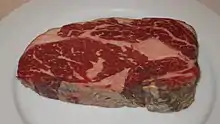Entrecôte
In French, entrecôte (French pronunciation: [ɑ̃.tʁə.kot]) is a premium cut of beef used for steaks.
.jpg.webp)

A traditional entrecôte comes from the rib area[1][2] corresponding to the steaks known in different parts of the English-speaking world as rib, rib eye, Scotch fillet, club, or Delmonico.
The sirloin cut properly known as a contre-filet is also known as entrecôte. Contre-filet is the portion of the sirloin on the opposite side of the bone from the filet, or tenderloin. In English, a steak cut from the contre-filet may be called a Porterhouse steak (as the term is understood in Australia and New Zealand), a sirloin steak, a strip steak, a striploin steak, a wing steak, a club steak, a Delmonico steak, a New York strip steak, or a Kansas City strip steak. As well, if the contre-filet is left on the bone with the filet, the entire steak is called a Porterhouse steak (as the term is understood in the United States and Canada) or a T-bone steak.
See also
| Look up entrecôte in Wiktionary, the free dictionary. |
References
| Wikimedia Commons has media related to Entrecôte. |
- "entrecôte". Merriam-Webster Dictionary. Retrieved 2019-07-29.
- Danilo Alfaro (2019-07-15). "What Is Entrecôte?".